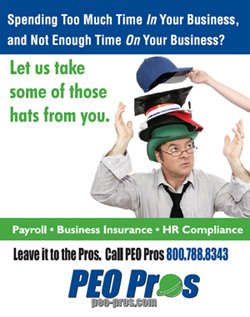 This article is an outline of a talk that our CEO gives to various groups. Please contact us if you are interested in such a talk
This article is an outline of a talk that our CEO gives to various groups. Please contact us if you are interested in such a talk
Myth # 7: “I don’t need to be on my payroll – I can take distributions.”
Our CPAs have always advised us that even though Subchapter S corps and LLCs allow “distributions” to owners, the IRS expects you to run a payroll and use those distributions for special or unusual circumstances. A failure to run a payroll regularly can “raise a flag” on your return, which may make you subject to an audit.
Myth # 6: “If I have Workers’ Comp insurance claims don’t affect me.”
While it is true that in most cases the full burden of the claim falls upon the insurance company, it is important to remember that an “experience modifier” follows your corporation or business entity throughout its lifetime. Excessive claims can raise this modifier, which will correspondingly raise your workers’ comp premium.
Myth # 5: “A payroll service will relieve me of the worry of paying payroll taxes.”
Some payroll services, especially PEOs, who legally become the employer of record, can certainly mitigate the liability associated with payroll taxes. With a standard payroll service however, it is your FEIN that goes on the return and hence you will be audited if there is a problem. It is true that a reputable payroll service will “stand by your side” at the audit but you will still have some, if not all, of the responsibility. In a PEO situation the lion’s share of the liability rests with the PEO since it is their FEIN that is on the return.
Myth # 4: “Unemployment Claims do not cost me time or money.”
This gets monitored much the same way workers’ comp claims do. The state will keep a record of your claim history and can adjust your rate up or down on an annual basis. Certainly managing your employees properly and terminating them according to correct procedures will reduce your unemployment rate exposure.
Myth # 3: “We have our posters up so we are in compliance.”
Oh really? How old are those posters? Have you checked with all the state, federal and local authorities? Wouldn’t it be nice to have someone do that for you?
Myth # 2: “I’m exempt from Workers’ Comp because I don’t have enough employees.”
This is a great misunderstanding. NO ONE is exempt from Workers’ Comp in the United States of America. If an employee is injured on the job it falls under the Workers’ Compensation Act and the employer is responsible for all medical, legal, and administrative expenses involved with the claim, as well as paying lost wages from time out of work, typically two-thirds of the normal wage.
In most states, you may apply for an Insurance Exemption, which allows you to be self-insured. This depends on the number of employees. In Florida it is 3 or fewer employees besides the owners, or 1 employee in the construction field. You may be “exempt” from having an insurance policy but you still are subject to workers’ comp.
Myth # 1: “I don’t have employees, all my people are 1099 contractors.”
There is no doubt that many people in a contracting situation legally and are truly 1099 contractors. However, this is one of the most widely abused categories in the employment arena today. The 1099 is meant for those people that are truly independent, NOT just a way to avoid paying taxes.
Myth # .5: “I can do it without professional help.”
Good luck with that 🙂
We hope you will view us as a resource. You probably don’t need our services now, but you want the firetruck to know how to get to your house! Some of you might have even “smelled some smoke” while we were talking …
 Some of our partner PEOs are offering a new service to their client employees.
Some of our partner PEOs are offering a new service to their client employees.






 This article is an outline of a talk that our CEO gives to various groups. Please contact us if you are interested in such a talk
This article is an outline of a talk that our CEO gives to various groups. Please contact us if you are interested in such a talk


 Our staff has taken on the incredible task of sorting through the 2900+ pages of the new health care bill – HR 3590.
Our staff has taken on the incredible task of sorting through the 2900+ pages of the new health care bill – HR 3590.

 A primary tax that affects business owners is the state unemployment tax assessment (SUTA).
A primary tax that affects business owners is the state unemployment tax assessment (SUTA).